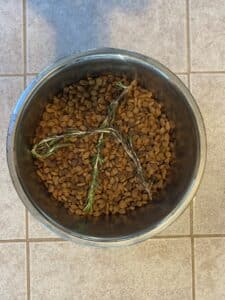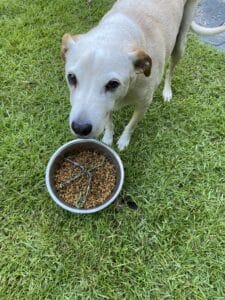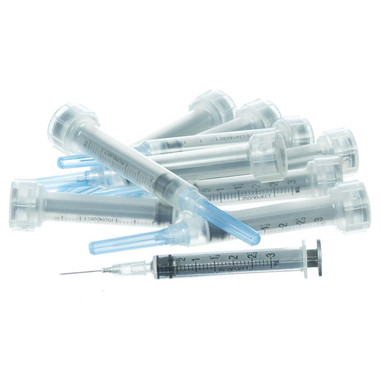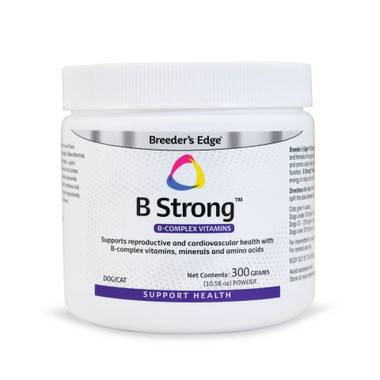Yikes! My Dog is Chewing on My Rosemary plant! Is this OK?
Estimated 0 min read

Rosemary in dog food. Is this safe?
Picture this: You’re in the kitchen, whipping up a culinary masterpiece. A sprig of rosemary in hand, you glance at your four-legged friend. His eyes meet yours, full of curiosity and a hint of longing. You pause, the fragrant herb hovering over the sizzling pan. Can your canine companion partake in this herbaceous delight?
Navigating the world of dog-friendly foods can feel like a game of fetch in a minefield. One wrong throw and… well, it’s not a pleasant thought. But fear not, because we’re here to help you decipher the do’s and don’ts of your dog’s diet, starting with the aromatic wonder that is named…rosemary.
So, can dogs eat rosemary? Is it a fragrant friend or a herbaceous hazard? Let’s uncover the truth, one leaf at a time, and put your mind (and your pup’s appetite) at ease.
Facts about giving rosemary to dogs
- Rosemary, in moderation, is safe and potentially beneficial for dogs, offering antioxidant properties and digestive aid.
- Rosemary essential oil isnot safefor dogs due to its high concentration.
- Overconsumption of rosemary can lead to digestive issues in dogs, requiring veterinary consultation.
Is rosemary safe for dogs?

Furry friend investigating rosemary.
Yes, in small doses!
The American Society for the Prevention of Cruelty to Animals (ASPCA) gives a wag of approval to rosemary for our canine companions. Yes, this fragrant herb, beloved in kitchens worldwide, is non-toxic to dogs. But before you let your pup dive nose-first into a rosemary bush, there’s a ‘paws’ for thought.
While rosemary is safe, it’s not an all-you-can-eat buffet. Just like us, dogs can experience tummy troubles if they overindulge. Imagine eating a whole rosemary bush – you’d feel pretty ruff, right? The same goes for our four-legged friends. Too much of this good thing can lead to an upset stomach and indigestion.
So, while Fido can indeed partake in the rosemary goodness, moderation is key. Think of it as a flavorful garnish to their regular chow, rather than the main course.
Now that we’ve sniffed out the safety of rosemary for dogs, you’re probably curious about the potential benefits this herb might offer. Could it be more than just a tasty treat? Let’s dig a little deeper and find out!
Health benefits of rosemary for dogs
Rosemary isn’t just a culinary delight; it’s a treasure trove of health benefits. But does this apply to our canine friends too? Let’s embark on a journey to discover the potential perks of this aromatic herb for our dogs.
Rosemary as a source of antioxidants for dogs
Rosemary is like a superhero in the world of herbs, armed with potent antioxidant properties. These antioxidants are like the good guys in a comic book, battling the cell-damaging villains known as free radicals. In dogs, this can help support a robust immune system and potentially ward off serious ailments like cancer and cardiovascular disease. So, sprinkling a little rosemary on your dog’s dinner could be like giving them their very own superpower!

Rosemary may aid in digestion
Rosemary as a canine digestive aid
Does your dog ever get a case of the grumbles? No, not the kind that they make when you’re five minutes late with dinner. We’re talking about those tummy grumbles that signal digestive discomfort. A touch of Rosemary might just be the remedy. Known to alleviate digestive issues like gas and indigestion, it’s like a soothing pat on your pup’s belly. Plus, its antimicrobial properties can offer relief from gastrointestinal problems caused by harmful bacteria.
Rosemary as a natural preservative
Rosemary isn’t just a tasty addition to your dog’s meal; it’s also a secret weapon in the fight against bacteria. Rosemary extract is a popular preservative in dog food, helping to keep it fresh and free from bacterial growth. So, when you see rosemary extract listed on your dog food ingredients, it’s not just there for flavor. Au contraire, it’s working hard to keep your pup’s food safe and delicious.
Rosemary as a flea repellent
If your dog’s been itching more than usual, rosemary might offer some relief. The herb’s scent is a natural flea deterrent, making it a chemical-free option to keep those pesky parasites at bay. Plus, it can add a glossy shine to your dog’s coat, making them the envy of the dog park.
Remember, while rosemary has many potential benefits, it’s not a cure-all, and it’s essential to consult with your vet before making significant changes to your dog’s diet. After all, every dog is unique, and what works for one might not work for another. But who knows? Rosemary might just be the secret ingredient your pup’s been missing!
How to give rosemary to dogs

Sprinkle rosemary leaves in dog food.
So, you’re ready to introduce your pup to the rosemary club. But how do you go about it? Don’t worry, we’ve got the scoop (and it’s not just for poop)!
Firstly, remember that rosemary is like the truffle oil of the doggy world – a little goes a long way. A sprinkle here and there in their food is all you need to jazz up their mealtime. Fresh or dried leaves, finely chopped, are the best way to serve up this herb. It’s like adding a dash of canine confetti to their dinner!
But hold your horses – or should we say, hold your dogs? While rosemary is a delightful addition to their diet,rosemary essential oil is a no-go. It’s like the forbidden fruit of the rosemary world. This concentrated oil can be too intense for our furry friends, so it’s best to keep it out of their bowl and off their coat.
And just like with any new food, it’s important to start slowly. Think of it as a culinary introduction. You wouldn’t dive headfirst into a pool without dipping a toe in first, right? The same goes for your dog with rosemary. Start with a tiny amount and gradually increase it if your dog takes a liking to it.
Now, you might be wondering, “What if my dog is expecting puppies?” In that case, rosemary should beoff the menu. It’snot recommended for pregnant dogs, so it’s best to stick to their regular diet during this special time.
So, you’re all set to make mealtime a bit more interesting for your pup. With a sprinkle of rosemary, you’ll be serving up a host of potential health benefits. But what if your dog decides to go on a rosemary munching spree?
What to do if your dog ate too much rosemary

Dog nibbles on rosemary.
We’ve all been there – eyes bigger than our stomachs, and before we know it, we’ve overindulged. Dogs are no different, especially when it comes to tasty treats like rosemary. But what happens when your pooch has had one too many bites of this herb? Let’s navigate this prickly situation together.
Look for signs of discomfort
Dogs have a way of telling us when something’s not right, even if they can’t speak our language. If your dog has had a rosemary feast, they might experience an upset stomach or indigestion. Look out for signs of discomfort like excessive drooling, vomiting, or changes in their poop. They might also seem less energetic or lose their appetite. Remember, dogs are experts at hiding their discomfort, so keep a close eye on them.
Contact your veterinarian.
If you notice any signs of discomfort in your dog after they’ve eaten rosemary, it’s time to ring up your vet. While rosemary is generally safe for dogs, too much of it can cause digestive issues. Your vet can provide guidance on what to do next, whether it’s to monitor your dog at home or bring them in for a check-up.
Never give your dog rosemary essential oil

Do not give your dog rosemary essential oils.
Remember when we said rosemary essential oil is a no-go for dogs? Well, if your dog gets into this, it’s a bit more serious than overeating the herb. The concentrated oil can cause irritation to your dog’s skin and, lead to more severe health issues if ingested. If your dog has consumed rosemary essential oil, contact your vet immediately.
Overindulging in rosemary is not a walk in the park for your dog, but with careful observation and prompt action, it’s a situation you can handle. After all, being a pet parent is all about expecting the unexpected, right?
In the world of canine cuisine, rosemary can be a delightful addition. But, as we said, moderation is key. Here at Banixx, we’re committed to helping you navigate the ins and outs of pet health, from diet tips to wellness advice.
So, whether you’re curious about canine nutrition or looking for ways to keep your pup’s tail wagging, we’ve got you covered with our dogblog. We update it regularly with new info. If you’re interested in maintenance topics such as how toClean up messy eye boogers or goopor tips on maintaining yourdog’s nails/claws, yes, we cover that. Or are you curious about more quirky items? For instance…how long can a dog go without peeing, yep, we’ve got that one! As always, a well-cared-for dog is a happy dog!
Dogs and Rosemary Sources
https://www.thesprucepets.com/is-rosemary-safe-for-dogs-6742158
https://www.aspca.org/pet-care/animal-poison-control/toxic-and-non-toxic-plants/rosemary
https://www.rover.com/blog/can-my-dog-eat-rosemary/
https://csef.usc.edu/History/2015/Projects/J2103.pdf
https://sports.yahoo.com/rosemary-safe-dogs-120000576.html#:~:text=According%20to%20Kurt%20Venator%2C%20DVM,as%20for%20cats%20and%20horses.
https://a-z-animals.com/blog/can-your-dog-eat-rosemary-what-are-the-benefits-or-risks/
https://www.preventivevet.com/dogs/herbs-spices-for-dogs
https://www.hepper.com/can-dogs-eat-rosemary/
https://a-z-animals.com/blog/can-your-dog-eat-rosemary-what-are-the-benefits-or-risks/

















